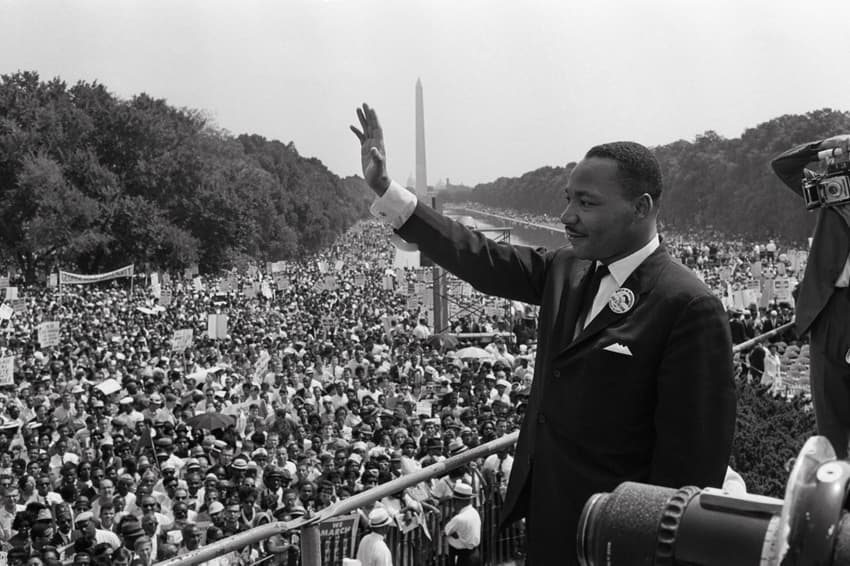France defends its all-white Martin Luther King tribute

France's education ministry has defended the creation of a video of schoolchildren paying tribute to American civil rights campaigner Martin Luther King, which featured not a single person of colour.
The video - released to mark the 60th anniversary of Martin Luther King's famous 'I have a Dream' speech - has attracting stinging criticism from around the world because it features only white pupils.
In it, French children recite (in English) short speeches inspired by the 'I have a Dream' speech, calling for tolerance, inclusion and better awareness of environmental issues.
https://twitter.com/education_gouv/status/1696554471805890763
However, as many social media users pointed out - all the children are white and none of them specifically address the issue of racism, which is the subject of King's original speech.
But the Education Ministry hit back at the criticism, saying that the pupils in the video were this year's winners of The More I Say competition, which encourages the creative use of the English language in schools.
"To honour the memory of Martin Luther King on the 60th anniversary of his famous speech on August 28th, 1963, the 2023 competition winners were invited to give a short speech inspired by King's speech, beginning with 'I have a dream'."
https://twitter.com/education_gouv/status/1696602633824272636
The row taps into long-running criticism in France over the French state's 'colourblind' policy.
Under the current legal framework the State does not officially recognise race - so for example census data does not include the race or ethnicity of respondents. There is therefore no policy of positive discrimination or quotas based on race or ethnicity.
Supporters of the policy say that it simply treats everyone equally, but its detractors say that it is a convenient way to cover up discrimination and racism, and point to low numbers of people of colour in high-profile roles such as politics or business.
It also makes it hard to address issues of discrimination - for example campaigners have long argued that supposedly random police ID checks strongly target people of colour, but police forces do not report the ethnicity of people they stop, making the allegation hard to prove.
READ ALSO Is France really colourblind? Or just blind to racism?
Comments
See Also
The video - released to mark the 60th anniversary of Martin Luther King's famous 'I have a Dream' speech - has attracting stinging criticism from around the world because it features only white pupils.
In it, French children recite (in English) short speeches inspired by the 'I have a Dream' speech, calling for tolerance, inclusion and better awareness of environmental issues.
https://twitter.com/education_gouv/status/1696554471805890763
However, as many social media users pointed out - all the children are white and none of them specifically address the issue of racism, which is the subject of King's original speech.
But the Education Ministry hit back at the criticism, saying that the pupils in the video were this year's winners of The More I Say competition, which encourages the creative use of the English language in schools.
"To honour the memory of Martin Luther King on the 60th anniversary of his famous speech on August 28th, 1963, the 2023 competition winners were invited to give a short speech inspired by King's speech, beginning with 'I have a dream'."
https://twitter.com/education_gouv/status/1696602633824272636
The row taps into long-running criticism in France over the French state's 'colourblind' policy.
Under the current legal framework the State does not officially recognise race - so for example census data does not include the race or ethnicity of respondents. There is therefore no policy of positive discrimination or quotas based on race or ethnicity.
Supporters of the policy say that it simply treats everyone equally, but its detractors say that it is a convenient way to cover up discrimination and racism, and point to low numbers of people of colour in high-profile roles such as politics or business.
It also makes it hard to address issues of discrimination - for example campaigners have long argued that supposedly random police ID checks strongly target people of colour, but police forces do not report the ethnicity of people they stop, making the allegation hard to prove.
READ ALSO Is France really colourblind? Or just blind to racism?
Join the conversation in our comments section below. Share your own views and experience and if you have a question or suggestion for our journalists then email us at [email protected].
Please keep comments civil, constructive and on topic – and make sure to read our terms of use before getting involved.
Please log in here to leave a comment.